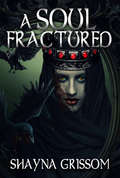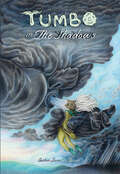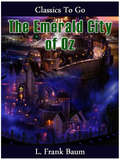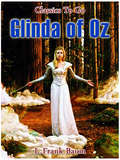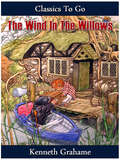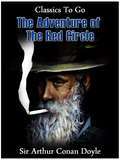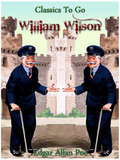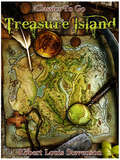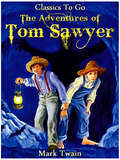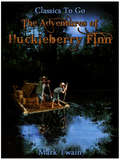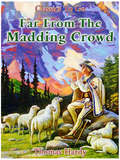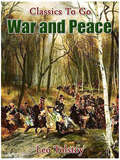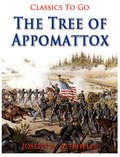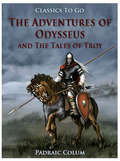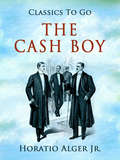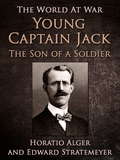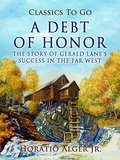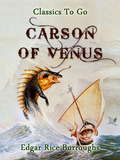- Table View
- List View
Sole voices (Post Worlds Series)
by Kristina M. SerranoPeace, finally. Or so Selk and Whistler think. Barely after stepping off the plane from a second successful artifact mission, they’re confronted with staggering news. Safi, an acquaintance and descendant of Khonsu, reveals his family has discovered an artifact that he and Selk must return together. And Khonsu, the last living immortal, insists Selk and Safi must be “blended”—married—to return it. Selk racks her brain for loopholes that will keep everyone safe without keeping her and Whistler apart. But Khonsu has other plans, going to violent lengths to forbid their relationship. After entering the most challenging, unpredictable Post World yet, she knows learning Khonsu’s corrupt secrets are the best chance at survival. And this Post World itself is hiding something that will test just how much she loves Whistler. A test she’ll take without hesitation, but one that could finally cost her life.
A A Soul Fractured (The Soul Series)
by Shayna GrissomThe King of Hell was lost ages ago, and it has been the steward's task to sort the souls into their designated regions and maintain control of the world. Nora, the steward's stepdaughter, was an outcast, and in many ways, she still is. After a heated argument, Nora does something inexplicable, and she soon finds herself out of the castle and in a forest with soul-eating giants. It's then that Nora meets Aegis, an immortal, who suspects Nora is more than an ordinary girl.
Say More: Consent Conversations for Teens
by Kitty StrykerTalking about consent can feel overwhelming, especially for young people who may be navigating their own boundaries for the first time. In Say More, consent culture activist Kitty Stryker guides teenagers in exploring what consent means to them. This timely and practical workbook allows the reader to work at their own pace and in their own way, with concrete examples from Kitty' s youth, prompts inspired by questions teens have asked her and comprehensive resources to encourage exploration and introspection.
Tumbo in The Shadows
by Esther Samuels-DavisHeartfelt and fantasyful, Tumbo in The Shadows forges a path through the uncharted territory of self-rediscovery. After his identity goes up in smoke, Tumbo must learn how to harness the spark left inside, feeling his way out of melancholy before it becomes him. A lighthearted journey through the shadowy depths of the soul, this modern fairytale explores and questions the meaning of finding life's purpose.
William Wilson: Revised Edition Of Original Version (Classics To Go)
by Edgar PoeWilliam Wilson ist eine stark autobiografisch eingefärbte Erzählung von Edgar Allan Poe aus dem Jahr 1839, die das literarische Motiv des Doppelgängers benutzt, um den Widerspruch zwischen tatsächlichem Handeln und Gewissen zu dramatisieren. Der Ich-Erzähler erklärt, dass er sich den Namen William Wilson nur zugelegt habe, weil sein wirklicher Name allzu sehr mit bösen Taten verhaftet sei. Er erklärt dem Leser, dass er diesen Bericht nur schreibt, um klar zu machen, warum und wie er zu einem Kriminellen wurde…
The Emerald City of Oz (The Land of Oz #6)
by L. Frank BaumDorothy speaks freely of her adventures to her only living relatives, her Aunt Em and Uncle Henry. Neither of them believes a word of her stories, but consider her a dreamer. <P><P>Later, it is revealed that the destruction of their farmhouse by the tornado back in "The Wonderful Wizard Of Oz" has left Uncle Henry in terrible debt. In order to pay it, he has taken out a mortgage on his farm. If he cannot repay his creditors, they will seize the farm. He is not afraid for himself, but both he and his wife, Aunt Em, fear very much for their niece's future. Dorothy arranges with Princess Ozma to take them to the Land of Oz, where they will be safe. Using the magic belt (a tool captured from the jealous Nome King Roquat), Ozma transports them to her throne room. They are given rooms to live in and luxuries to enjoy, including a vast and complex wardrobe. They meet with many of Dorothy's animal friends, including the Cowardly Lion and Billina, the Yellow Hen.
Glinda of Oz (The Land of Oz #14)
by L. Frank BaumPrincess Ozma and Dorothy travel to an obscure corner of the Land of Oz, in order to prevent a war between two local powers, the Skeezers and the Flatheads. <P><P>The leaders of the two tribes prove obstinate. Unable to prevent the war, Dorothy and Ozma find themselves imprisoned on the Skeezers' glass-covered island, which has been magically submerged to the bottom of its lake. Their situation worsens when the warlike queen Coo-ee-oh, who is holding them captive and who alone knows how to raise the island back to the surface of the lake, loses her battle and gets transformed into a swan, forgetting all her magic in the process. Ozma and Dorothy summon Glinda, who, with help from several magicians and magical assistants, must find a way to raise the island and liberate its trapped inhabitants.
The Wind in the Willows: Revised Edition Of Original Version (Classics To Go)
by Kenneth GrahameAt the start of the book, it is spring time: the weather is fine, and good-natured Mole loses patience with spring cleaning. He flees his underground home, heading up to take in the air. He ends up at the river, which he has never seen before. Here he meets Ratty (a water rat), who at this time of year spends all his days in, on and close by the river. Rat takes Mole for a ride in his rowing boat. They get along well and spend many more days boating, with Rat teaching Mole the ways of the river. One summer day shortly thereafter, Rat and Mole find themselves near the grand Toad Hall and pay a visit to Toad. Toad is rich (having inherited wealth from his father): jovial, friendly and kind-hearted but aimless and conceited, he regularly becomes obsessed with current fads, only to abandon them as quickly as he took them up. Having only recently given up boating, Toad's current craze is his horse-drawn caravan. In fact, he is about to go on a trip, and persuades the reluctant Rat and willing Mole to join him. The following day (after Toad has already tired of the realities of camp life and sleeps-in to avoid chores), a passing motorcar scares the horse, causing the caravan to overturn into a ditch. Rat does a war dance and threatens to have the law on the motorcar drivers while Mole calms the horse, but this marks the immediate end of Toad's craze for caravan travel, to be replaced with an obsession for motorcars. When the three animals get to the nearest town, they have Toad go to the police station to make a complaint against the vandals and their motorcar and thence to a blacksmith to retrieve and mend the caravan. Toad - in thrall to the experience of his encounter - refuses. Rat and Mole find an inn from where Mr. Toad's horse is taken care of and they organise the necessary steps and, exhausted, return home by train. Meanwhile, Toad makes no effort to help, instead deciding to order himself a motorcar. (Excerpt from Wikipedia)
The Adventure of the Red Circle (Classics To Go)
by Sir Arthur Conan DoyleMrs. Warren, a landlady, comes to 221B Baker Street with some questions about her lodger. A heavily bearded man, who spoke good but accented eng came to her and offered double her usual rent on the condition that he get the room on his own terms. He went out the first night that he was there, and came back after midnight when the rest of the household had gone to bed. Since then, neither Mrs. Warren, her husband, or their servant girl have seen him. The lodger insisted on having the Daily Gazette every morning, and sometimes requested other things. All requests were printed on a slip of paper left on a chair outside the room where meals were also left. Mrs. Warren has brought some spent matches and a cigarette end from her lodger, hoping that Holmes can read something from them. It is clear that the cigarette has been smoked without a holder, which is quite unusual for a man with whiskers. He also eats very little, and never receives visitors or messages… (Excerpt from Wikipedia)
William Wilson: Folge 32 (Classics To Go)
by Edgar PoeThe story follows a man of noble descent who calls himself William Wilson because, although denouncing his past, he does not accept responsibilities blame for his actions, saying that "man was never thus [...] tempted before". After several paragraphs, the narration then segues into a description of Wilson's boyhood, which was spent in a school "in a misty-looking village of England." William meets another boy in his school who shared the same name, who had roughly the same appearance, and who was even born on exactly the same date. William's name (he asserts that his actual name is only similar to "William Wilson") embarrasses him because it sounds "plebeian" or common, and he is irked that he must hear the name twice as much on account of the other William… (Excerpt from Wikipedia)
The Black Cat: Deluxe Binder Read-along Radio Drama W/cd (Classics To Go)
by Edgar Allan PoeThe story is told in the first person. He is a condemned man at the outset of the story. The narrator tells us that from an early age he has loved animals. He and his wife have many pets, including a large black cat named Pluto. This cat is especially fond of the narrator and vice versa. Their mutual friendship lasts for several years, until the narrator becomes an alcoholic. One night, after coming home intoxicated, he believes the cat is avoiding him. When he tries to seize it, the panicked cat bites the narrator, and in a fit of rage, he seizes the animal, pulls a pen-knife from his pocket, and deliberately gouges out the cat's eye. From that moment onward, the cat flees in terror at his master's approach. At first, the narrator is remorseful and regrets his cruelty. "But this feeling soon gave place to irritation. And then came, as if to my final and irrevocable overthrow, the spirit of perverseness." He takes the cat out in the garden one morning and hangs it from a tree, where it dies. That very night, his house mysteriously catches fire, forcing the narrator, his wife and their servant to flee... (Excerpt from Wikipedia)
Treasure Island: Prince Otto (Classics To Go)
by Robert StevensonThe narrator, James "Jim" Hawkins, is the young son of the owners of the Admiral Benbow Inn. An old drunken seaman named Billy Bones becomes a long-term lodger at the inn, only paying for about the first week of his stay. Jim quickly realizes that Bones is in hiding, and that he particularly dreads meeting an unidentified seafaring man with one leg. Some months later, Bones is visited by a mysterious sailor named Black Dog. Their meeting turns violent, Black Dog flees and Bones suffers a stroke. While Jim cares for him, Bones confesses that he was once the mate of a notorious late pirate, Captain Flint, and that his old crew-mates want Bones' sea chest. Some time later, another of Bones' crew mates, a blind man named Pew, appears at the inn and forces Jim to lead him to Bones. Pew gives Bones a paper. After Pew leaves, Bones opens the paper to discover it is marked with the Black Spot, a pirate summons, with the warning that he has until ten o'clock to meet their demands. Bones drops dead of apoplexy (in this context, a stroke) on the spot. Jim and his mother open Bones' sea chest to collect the amount due to them for Bones' room and board, but before they can count out the money that they are owed, they hear pirates approaching the inn and are forced to flee and hide, Jim taking with him a mysterious oilskin packet from the chest. The pirates, led by Pew, find the sea chest and the money, but are frustrated that there is no sign of "Flint's fist". Customs men approach and the pirates escape to their vessel, all except for Pew, who is accidentally run down and killed by the agents' horses.... (Excerpt from Wikipedia)
The Adventures of Tom Sawyer: Revised Edition Of Original Version (Classics To Go #305)
by Mark TwainTom Sawyer lived with his Aunt Polly and his half-brother, Sid. Tom dirties his clothes in a fight and is made to whitewash the fence the next day, as punishment. He cleverly persuades his friends to trade him small treasures for the privilege of doing his work. In Sunday school, Tom does not manage to get a Bible because Mr. Walters knew he was trading tickets. Tom falls in love with Becky Thatcher, a new girl in town, and persuades her to get "engaged" by kissing him. But their romance collapses when she learns Tom has been "engaged" previously, to a girl named Amy Lawrence. Shortly after being shunned by Becky, Tom accompanies Huckleberry Finn to the graveyard at night, where they witnessed the murder of Dr. Robinson. Tom, Huck, and Joe Harper run away to an island. While enjoying their newfound freedom, the boys become aware that the community is sounding the river for their bodies. Tom sneaks back home one night to observe the commotion. After a brief moment of remorse at his loved ones' suffering, Tom is struck by the idea of appearing at his funeral. Back in school, Tom gets himself back in Becky's favour after he nobly accepts the blame for a book she has ripped. Soon, Muff Potter's trial begins, in which Tom testifies against 'Injun Joe'. Potter is acquitted, but 'Injun Joe' flees the courtroom through a window. Tom then begins to fear for his life as 'Injun Joe' is at large and can easily find him. Summer arrives, and Tom and Huck go hunting for buried treasure in a haunted house. After venturing upstairs they hear a noise below. Peering through holes in the floor, they see 'Injun Joe' disguised as a deaf-mute Spaniard; 'Injun Joe' and his companion plan to bury some stolen treasure of their own. From their hiding spot, Tom and Huck wriggle with delight at the prospect of digging it up. Huck begins to shadow 'Injun Joe' nightly, watching for an opportunity to nab the gold. Meanwhile, Tom goes on a picnic to McDougal's Cave with Becky and their classmates. That same night, Huck sees 'Injun Joe' and his partner making off with a box. He follows and overhears their plans to attack the Widow Douglas. By running to fetch help, Huck stops the violence and becomes an anonymous hero. A week later, Tom takes Huck to the cave and they find the box of gold, the proceeds of which are invested for them. The Widow Douglas adopts Huck, and, when Huck attempts to escape civilised life, Tom tricks him into thinking if Huck returns to the widow, he can join Tom's robber band. Reluctantly, Huck agrees and goes back to the Widow Douglas.
The Adventures of Huckleberry Finn: Revised Edition Of Original Version (Classics To Go #313)
by Mark TwainThe story begins in fictional St. Petersburg, Missouri on the shore of the Mississippi River, sometime between 1835 and 1845, (when the first steamboat sailed down the Mississippi). Huckleberry "Huck" Finn, the first person narrator and his friend, Thomas "Tom" Sawyer, have each come into a considerable sum of money as a result of their earlier adventures " The Adventures of Tom Sawyer". Huck explains how he is placed under the guardianship of the Widow Douglas, who, together with her stringent sister, Miss Watson, are attempting to civilise him and teach him religion. Finding civilised life confining, his spirits are raised somewhat when Tom Sawyer helps him to escape one night past Miss Watson's slave Jim, to meet up with Tom's gang of self-proclaimed "robbers." Just as the gang's activities begin to bore Huck, he is suddenly interrupted by the reappearance of his shiftless father, "Pap", an abusive alcoholic. Knowing that Pap would only spend the money on alcohol, Huck is successful in preventing Pap from acquiring his fortune; however, Pap gains legal custody of Huck and leaves town with him... (Excerpt from Wikipedia)
Far from the Madding Crowd: Revised Edition Of Original Version (Classics To Go)
by Thomas HardyGabriel Oak is a young shepherd. With the savings of a frugal life, and a loan, he has leased and stocked a sheep-farm. He falls in love with a newcomer eight years his junior, Bathsheba Everdene, a proud beauty who arrives to live with her aunt, Mrs. Hurst. She comes to like him well enough, and even saves his life once, but when he makes her an unadorned offer of marriage, she refuses; she values her independence too much and him too little. Gabriel's blunt protestations only serve to drive her to haughtiness. After a few days, she moves to Weatherbury, a village some miles off. When next they meet, their circumstances have changed drastically. An inexperienced new sheep dog drives Gabriel's flock over a cliff, ruining him. After selling off everything of value, he manages to settle all his debts, but emerges penniless. He seeks employment at a work fair in the town of Casterbridge, (a fictionalised version of Dochester). When he finds none, he heads to another fair in Shottsford, a town about ten miles from Weatherbury. On the way, he happens upon a dangerous fire on a farm and leads the bystanders in putting it out. When the veiled owner comes to thank him, he asks if she needs a shepherd. She uncovers her face and reveals herself to be none other than Bathsheba. She has recently inherited the estate of her uncle and is now a wealthy woman. Though somewhat uncomfortable, she hires him. Meanwhile, Bathsheba has a new admirer: the lonely and repressed William Boldwood. Boldwood is a prosperous farmer of about forty whose ardour Bathsheba unwittingly awakens when – her curiosity piqued because he has never bestowed on her the customary admiring glance – she playfully sends him a valentine sealed with red wax on which she has embossed the words "Marry me". Boldwood, not realising the valentine was a jest, becomes obsessed with Bathsheba, and soon proposes marriage. Although she does not love him, she toys with the idea of accepting his offer; he is, after all, the most eligible bachelor in the district. However, she postpones giving him a definite answer. When Gabriel rebukes her for her thoughtlessness, she fires him. When her sheep begin dying from bloat, she discovers to her chagrin that Gabriel is the only man who knows how to cure them. Her pride delays the inevitable, but finally she is forced to beg him for help. Afterwards, she offers him back his job and their friendship is restored... (Excerpt from Wikipedia)
War and Peace: A Historical Novel, Volume 1... (Classics To Go)
by Leo TolstoyThe standard Russian text of "War and Peace" is divided into four books (fifteen parts) and an epilogue in two parts. "War and Peace" has a large cast of characters, the majority of whom are introduced in the first book. Some are actual historical figures, such as Napoleon and Alexander I. While the scope of the novel is vast, it is centred around five aristocratic families. The plot and the interactions of the characters take place in the era surrounding the 1812 French invasion of Russia during the Napoleonic Wars. (Excerpt from Wikipedia)
The Tree of Appomattox: A Story Of The Civil War's Close (Classics To Go #Vol. 8)
by Joseph AltshelerJoseph Alexander Altsheler (April 29, 1862 – June 5, 1919) was an American newspaper reporter, editor and author of popular juvenile historical fiction. His seven series comprise a total of thirty-two novels, each containing an independent story. The entire French and Indian War Series is very well written and accurate in its details. The characters were well developed and it is an excellent series combining historical fact and adventure with good fiction as are all of Altsheler's War Series.
The Adventures of Odysseus and The Tales of Troy: Revised Edition Of Original Version (Classics To Go)
by Padraic ColumAlso known as “The Children’s Homer,” this is Irish writer Padraic Colum’s retelling of the events of Homer’s Iliad and Odyssey for young people. Colum’s rich, evocative prose narrates the travails of Odysseus, King of Ithaca: his experiences fighting the Trojan War, and his ten years’ journey home to his faithful wife Penelope and his son Telemachus. (Summary by Elizabeth Klett )
The Young Acrobat of The Great North American Circus (Classics To Go)
by Jr. AlgerKit, a young teen boy, is an orphan. He is cheated of his inheritance by his guardian. His guardian sends him off to work with a brutal, stupid blacksmith. The boy runs away. He joins the circus. He is followed by the blacksmith. The boy stays away from him. He becomes a big star in the circus. Later, he is restored to his rightful place with the help of a man who was his father's friend.(Excerpt from Wikipedia)
Mark the Match Boy (Classics To Go)
by Jr. AlgerThe book takes the reader through the Children's Lodging House, the Bowery Theatre, and the Fulton ferry, besides giving one a description of the life of bootblacks, match boys, apple girls, Bowery B'hoys and other assorted street creatures living in New York.
Helping Himself: Grant Thornton's Ambition (Classics To Go)
by Jr. AlgerIn Alger's books real boys are seen doing honest things and being successful. Helping Himself begins with Deacon Gridley who was a farmer. Gridley had managed to save a little money. His thriftiness meant that he had also hoarded all of the interest. Here our young hero enters the tale.
The Cash Boy: Inspirational Story About A Poor Boy Ascending To Great Wealth And Fame (Classics To Go)
by Jr. AlgerFrank Fowler leaves his small town home shortly after the death of the only mother he has ever known to make his fortune in New York. These small town adventures are fully loaded with stock Alger characters…
Young Captain Jack / The Son of a Soldier: The Son Of A Soldier (The World At War)
by Edward StratemeyerHoratio Alger, Jr.; January 13, 1832 – July 18, 1899) was a prolific 19th-century American author, best known for his many juvenile novels about impoverished boys and their rise from humble backgrounds to lives of middle-class security and comfort through hard work, determination, courage, and honesty. His writings were characterised by the "rags-to-riches" narrative, which had a formative effect on America during the Gilded Age. His popularity—and income—dwindled in the 1890s. In 1896, he had (what he called) a "nervous breakdown"; he relocated permanently to his sister's home in South Natick, Massachusetts. Before his death, Alger asked Edward Stratemeyer to complete his unfinished works.[56] In 1901, “Young Captain Jack” was completed by Stratemeyer and promoted as Alger's last work. Alger once estimated that he earned only $100,000 between 1866 and 1896; at his death he had little money, leaving only small sums to family and friends. His literary work was bequeathed to his niece, to two boys he had casually adopted, and to his sister Olive Augusta, who destroyed his manuscripts and his letters at his wish. (Excerpt from Wikipedia)
A Debt of Honor: The Story Of Gerald Lane's Success In The Far West (Classics To Go)
by Jr. AlgerGerald Lane heads west to seek his fortune and claim the money owed his father by an unscrupulous former business partner.
Carson of Venus: Pirates Of Venus, Lost On Venus, Carson Of Venus (Classics To Go)
by Edgar BorroughsThe novel, which was written two years before the outbreak of World War II, satirises Nazi Germany by including a fascist political faction called the "Zani". There is also a character named "Muso" as a reference to Benito Mussolini. Unlike the first two Venus novels, Carson of Venus focuses on spy intrigue and war instead of wilderness adventuring. It also indicates a change of political orientation from that of the earlier books, where the villains were modelled on Russian Communists. (Wikipedia)

